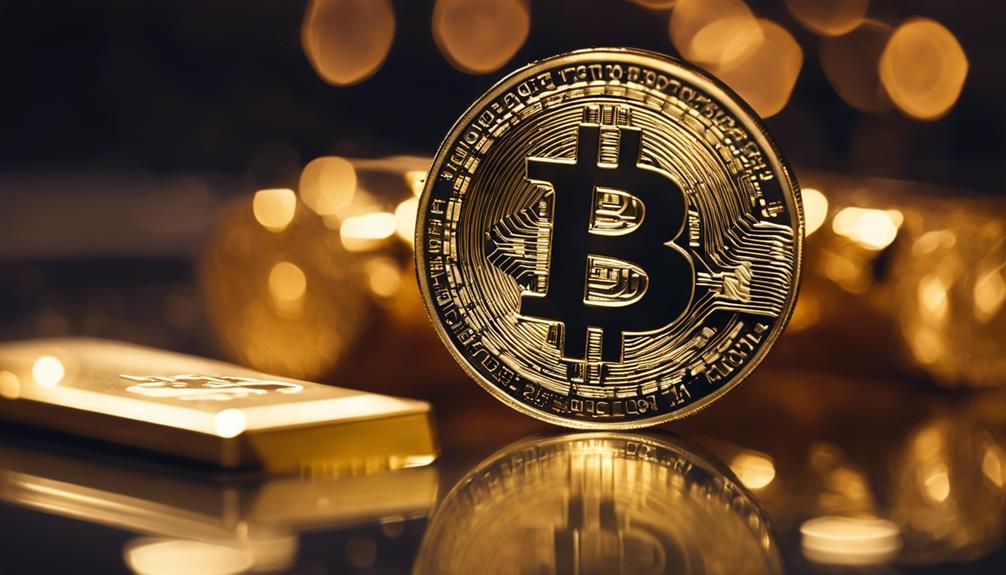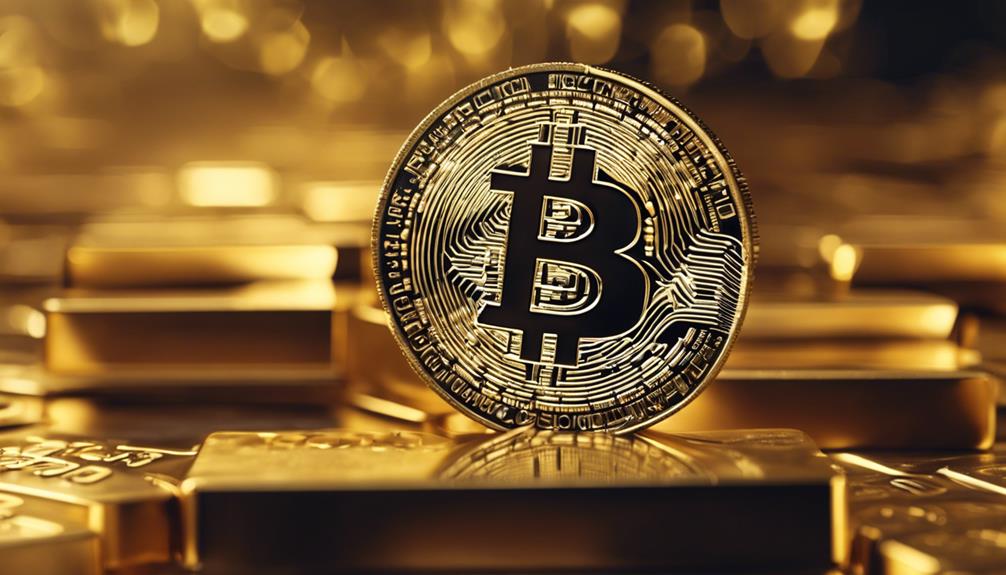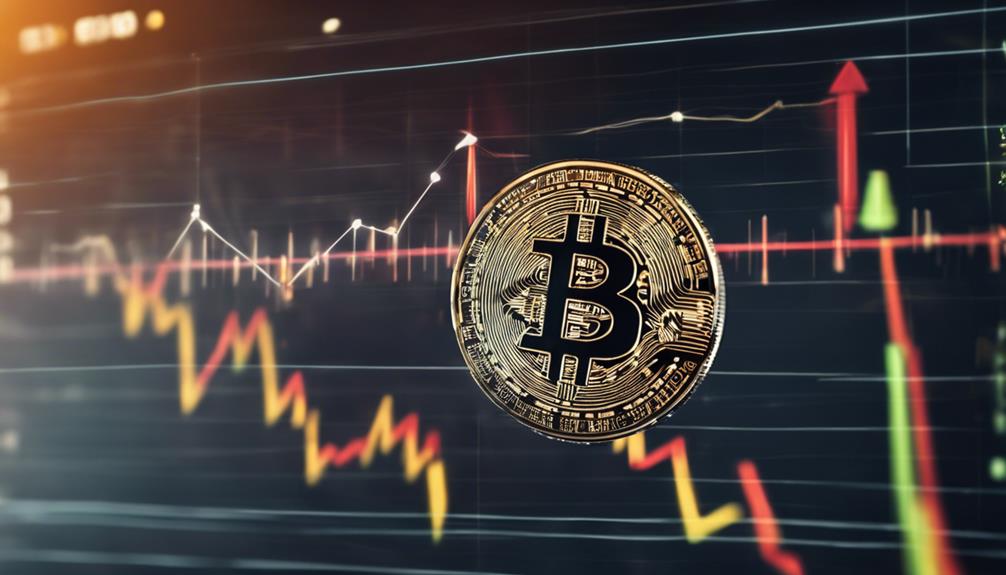In today’s ever-changing financial environment, the rapid rise of Bitcoin has sparked speculation about its potential to outshine gold’s long-standing supremacy. JPMorgan analysts have proposed that Bitcoin’s market cap would need to double to $3.3 trillion in order to rival gold. The current projection of $62 billion for spot Bitcoin ETFs within 2-3 years is significantly lower in comparison. The substantial volatility of Bitcoin currently makes it unrealistic to reach gold’s market cap. Despite attracting investors with its decentralized nature and scarcity, there are still obstacles preventing it from surpassing gold. The complex relationship between these two assets deserves further examination for a comprehensive understanding.
Key Takeaways
- Bitcoin's rising volatility-adjusted returns make it a contender against gold.
- Bitcoin's market cap needs significant growth to match gold's.
- Institutional interest and adoption trends favor Bitcoin over gold.
- Bitcoin's scarcity, decentralization, and technological advantages challenge gold's traditional value.
- Bitcoin's potential to challenge gold's dominance is evident in investment portfolios and market dynamics.
Bitcoin Vs Gold: a Store of Value Battle

Comparing Bitcoin and gold as stores of value reveals contrasting characteristics that impact their role in investment portfolios. Bitcoin has shown to be more appealing to investors in regard to volatility-adjusted returns compared to gold. Despite this, JPMorgan analysts project that Bitcoin's market capitalization would need to double to $3.3 trillion to match gold.
The higher volatility of Bitcoin makes achieving this in notional amounts currently unrealistic. JPMorgan suggests a potential size for a Bitcoin ETF of around $62 billion, based on a volatility ratio of 3.7. Realistic targets for spot Bitcoin ETFs are estimated to be around $62 billion within the next 2-3 years, taking into account the proportion of gold held in fund format.
These projections highlight the evolving landscape of investment choices, with Bitcoin emerging as a significant contender against the traditional store of value – gold.
Scarcity and Decentralization Comparison

The scarcity and decentralization of Bitcoin distinguish it from gold in fundamental ways, shaping its role in the evolving landscape of digital and traditional investments. Bitcoin's fixed supply limit of nearly 21 million coins sets it apart from gold, which has a finite supply on Earth, although new deposits can still be mined. Additionally, Bitcoin operates on a decentralized network, with no central authority controlling its issuance, contrasting with the centralized mining of gold by various entities.
| Aspect | Bitcoin | Gold |
|---|---|---|
| Supply Limit | Fixed supply limit of ~21 million coins | Finite supply with potential for new mining |
| Decentralization | Decentralized network | Centralized mining by companies & govts |
| Role | Potential digital replacement for gold | Traditional store of value |
Investors are drawn to Bitcoin's scarcity and decentralized network as key factors in its potential to surpass gold as a store of value. This combination of limited supply and decentralized nature positions Bitcoin as a promising contender in the ongoing debate over the future of currency.
Technological Advantages of Bitcoin

Bitcoin's technological advantages are evident in its security features, decentralized nature, and transparent transactions.
The blockchain technology behind Bitcoin guarantees secure and tamper-proof transactions, eliminating the need for intermediaries.
Additionally, Bitcoin's decentralized structure allows for censorship-resistant and global transactions, setting it apart from traditional currency systems.
Security Features of Bitcoin
Utilizing decentralized blockchain technology, Bitcoin incorporates essential security features that safeguard transactions and data integrity. The cryptographic algorithms in Bitcoin guarantee the immutability of the data on the blockchain, making it secure against tampering. Transactions are verified by network nodes using cryptography, enhancing security. Private keys in Bitcoin wallets play a vital role in providing secure access to funds and enabling the secure signing of transactions. Additionally, Bitcoin's proof-of-work consensus mechanism enhances the security of the network by requiring computational work to validate transactions. Below is a table summarizing key security features of Bitcoin:
| Security Feature | Description | Importance |
|---|---|---|
| Decentralized Blockchain | Records all transactions securely | Ensures transparency and security |
| Cryptographic Algorithms | Ensure data integrity on the blockchain | Enhances tamper-resistance |
| Network Node Verification | Verifies transactions securely through cryptography | Increases transaction security |
| Private Keys | Enable secure access to funds and transaction signing | Protects user assets |
Decentralized Nature of Bitcoin
Decentralization in Bitcoin signifies a revolutionary shift away from centralized control and authority in financial transactions. This decentralized system operates without a central authority, relying on a network of nodes to verify transactions, which enhances security and reduces the risk of censorship or manipulation by any single entity.
Users maintain control over their Bitcoin holdings without the need for traditional financial institutions. The transparent and immutable nature of Bitcoin transactions is made possible through a public ledger called the blockchain. This design guarantees that every transaction is recorded and can be viewed by anyone, promoting transparency and trust in the system.
The decentralized nature of Bitcoin offers a new way to conduct financial transactions, free from the constraints of centralized control.
Transparency in Bitcoin Transactions
With its transparent ledger system, Bitcoin revolutionizes the way financial transactions are conducted, providing unparalleled security and trust for users. Each Bitcoin transaction is recorded on a public ledger known as the blockchain, containing details such as the sender's and recipient's addresses, transfer amount, and timestamp. This transparency allows anyone to view transaction history and verify the authenticity of each transfer.
Investor Perspective: Inflation Hedge

Investors increasingly view Bitcoin as a compelling hedge against inflation due to its fixed supply and decentralized nature, setting it apart from traditional fiat currencies. With approximately 89% of the total Bitcoin supply already in circulation, the cryptocurrency's scarcity contrasts sharply with the potential for central banks to increase fiat currency supply, a factor that many people find appealing.
The data on Bitcoin's market cap and value fluctuations show its potential as a store of value, especially in times of economic uncertainty. Investors expect Bitcoin to continue gaining popularity as a hedge against inflation, given its characteristics as a digital currency with limited supply and store of value properties.
The comparison between Bitcoin and gold as inflation hedges highlights Bitcoin's increasing role in investment portfolios, signaling a shift towards digital alternatives for safeguarding wealth.
Bitcoin's Potential to Challenge Gold

Bitcoin's rise in volatility-adjusted terms has already outpaced gold in investment portfolios, signaling its potential to challenge the traditional precious metal. While JPMorgan analysts view it as unrealistic for bitcoin to match gold by notional amounts due to its higher volatility, the cryptocurrency has surpassed gold in portfolios when considering risk.
To equal gold's market capitalization, Bitcoin would need to reach $3.3 trillion, indicating a potential price doubling. Inflows into spot bitcoin ETFs have hit $19 billion, with questions arising about the sources of all net inflows. Realistic projections suggest these ETFs could grow to approximately $62 billion within the next 2-3 years, driven by rotational shifts in funds.
As investors seek assets with different risk profiles and growth potential, the ongoing trend towards digital currencies like Bitcoin could continue to reshape traditional portfolio allocations.
The Future of Store of Value

Bitcoin and gold stand at the forefront of the store of value debate, with each asset offering unique characteristics.
While Bitcoin's market cap would need to double to match gold, its adoption and demand are steadily increasing.
Despite Bitcoin's higher volatility, its potential as a store of value continues to intrigue investors seeking alternatives to traditional assets.
Bitcoin Vs Gold
In the domain of financial assets, the debate over the future of store of value between Bitcoin and Gold continues to captivate market observers. Bitcoin has outpaced gold in investors' portfolios when considering volatility-adjusted terms, but matching gold in notional amounts would require a market capitalization of $3.3 trillion.
JPMorgan analysts propose a potential size of about $62 billion for spot bitcoin ETFs, taking into account the proportion of gold held in fund format. Inflows into spot bitcoin ETFs have totaled $19 billion since launch, with uncertainties surrounding whether the entire $9 billion net inflow represents new money.
The growing allocation to bitcoin within investors' portfolios, exceeding that of gold in volatility-adjusted terms, underscores the significance of risk and volatility considerations in portfolio allocation decisions.
Adoption and Demand
With the increasing market capitalization and growing institutional interest in digital assets, the demand for a new store of value continues to shift towards alternative financial instruments like Bitcoin. Bitcoin's adoption as a store of value is on the rise, surpassing gold in volatility-adjusted market capitalization.
This shift is driven by factors such as Bitcoin's scarcity, fixed supply, and perceived ability to protect against inflation. Institutional interest in Bitcoin as a store of value is evident through the increasing number of companies adding Bitcoin to their balance sheets. The trend towards digital assets in the financial industry supports Bitcoin's potential to overtake gold as a preferred store of value.
Investor preferences are gradually moving towards digital assets like Bitcoin over traditional stores of value such as gold.
Price Volatility
As the focus shifts to price volatility, the future of store of value is increasingly shaped by the evolving dynamics between Bitcoin and gold in investors' portfolios.
In volatility-adjusted terms, Bitcoin has surpassed gold, but for Bitcoin to match gold's market capitalization, it would need to double in price, reaching $3.3 trillion. JPMorgan analysts consider it unrealistic for bitcoin to match gold in notional amounts due to its higher volatility.
Inflows into spot bitcoin ETFs have hit $19 billion, although there are doubts about whether all of this is new money. Realistic projections suggest that spot bitcoin ETFs could grow to around $62 billion in size within the next 2-3 years, indicating a significant potential for further growth in the cryptocurrency's adoption as a store of value.
Institutional Interest in Bitcoin

How has institutional interest in bitcoin transformed the landscape of traditional finance?
Institutional interest in bitcoin has surged, with major financial institutions recognizing the potential of digital assets like bitcoin as store of value and investment opportunities. Companies such as MicroStrategy and Tesla incorporating bitcoin into their balance sheets have set a precedent for others.
The Grayscale Bitcoin Trust (GBTC) has become a favored option for institutions seeking exposure to bitcoin. In addition, the approval of bitcoin futures trading on regulated exchanges has made it more accessible to institutional investors, fueling their interest.
Institutions are now increasingly viewing bitcoin as a hedge against economic uncertainties and inflation, driving further adoption of the cryptocurrency. This growing institutional interest signifies a significant shift in the financial landscape, where bitcoin is gaining recognition as a legitimate asset class with the potential to offer diversification and long-term value.
Implications for the Financial Market

In our analysis of the implications for the financial market, it's evident that the increasing institutional interest in bitcoin is reshaping traditional investment strategies and portfolio diversification approaches.
JPMorgan analysts suggest that while bitcoin's higher volatility makes it unrealistic to match gold in portfolios by notional amounts, it has surpassed gold in investors' portfolios in volatility-adjusted terms, underlining its risk profile. For bitcoin to equal gold's market capitalization, its price would need to double to $3.3 trillion.
Currently, only 7% of the $3.3 trillion gold held for investment purposes is in fund format, indicating potential growth in bitcoin ETFs. The projected net inflow into spot bitcoin ETFs could reach approximately $62 billion within 2-3 years, driven by shifts from existing instruments.
These developments signal significant implications for portfolio construction and investment strategies in the financial market, as bitcoin continues to gain traction and reshape the landscape of traditional assets like gold.
Frequently Asked Questions
Is Bitcoin Going to Replace Gold?
We believe bitcoin won't replace gold due to the substantial market capitalization needed to match gold. Realistic targets for spot bitcoin ETFs are determined by comparing the proportion of gold held in fund format.
Despite surpassing gold in volatility-adjusted terms, reaching a $3.3 trillion market cap would require bitcoin's price to double.
The argument centers on risk and volatility, making it unlikely for bitcoin to entirely replace gold in investors' portfolios.
Can Bitcoin Surpass Gold?
We believe Bitcoin has the potential to surpass gold in portfolios due to its increasing market cap and popularity. However, factors like volatility and price parity with gold need consideration.
Inflows into Bitcoin ETFs are significant but may not all be new money. Realistic projections suggest substantial growth for spot Bitcoin ETFs in the next few years.
Bitcoin's rising prominence makes it a contender to potentially outpace gold in the future.
Why Invest in Bitcoin Instead of Gold?
Investing in Bitcoin instead of gold offers advantages like accessibility, potential growth, and diversification. Bitcoin's innovative technology and limited supply attract investors seeking high returns. Its decentralized nature and ease of transactions make it appealing.
Additionally, the digital nature of Bitcoin provides flexibility and global accessibility, appealing to a modern investor base. Overall, choosing Bitcoin over gold can offer a dynamic and potentially lucrative investment opportunity.
Is the Status of Gold Threatened by Bitcoin?
We believe that the status of gold is currently being closely watched in comparison to Bitcoin.
With Bitcoin's increasing market capitalization and growing popularity among investors, there's a potential shift in the way people view traditional assets like gold.
As Bitcoin continues to gain traction and investment interest, it may pose a challenge to gold's long-standing position as a go-to safe haven asset.
Which is a More Stable Investment: Gold or Bitcoin?
When considering investing in gold vs bitcoin, it’s important to weigh the stability of each option. Gold has a long history as a store of value, offering stability during economic uncertainty. On the other hand, bitcoin’s value can be more volatile due to its speculative nature.
Conclusion
In the battle between Bitcoin and gold as stores of value, it's clear that Bitcoin is gaining momentum. With its technological advantages, potential to challenge gold, and growing institutional interest, Bitcoin is positioning itself as a contender in the financial market.
While gold has long been a symbol of stability, the rise of Bitcoin may just be the ironic twist needed to shake up the traditional hierarchy of precious assets.










